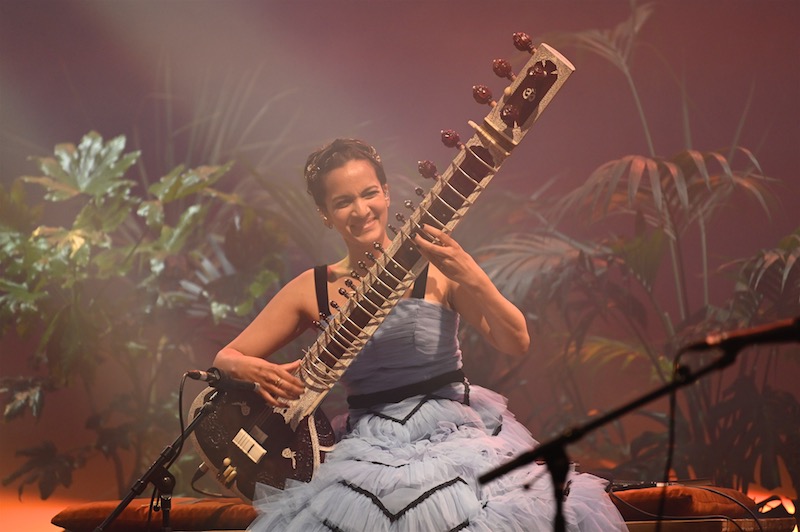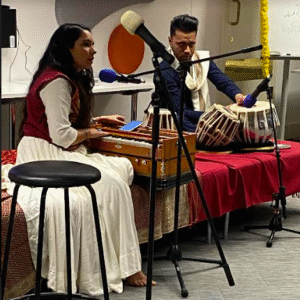Love Letters
Anoushka Shankar
30 May 2021
Royal Festival Hall, Southbank Centre, London
Reviewed by Ken Hunt
Let’s set the scene. Since the Corona pandemic ushered in a weird new world of vaccine inequality, jabs and double jabs, something which used to seem so ‘simple’, let’s get specific, going to a live concert or recital now comes freighted. Newly reopened, the Festival Hall adhered to requirements for social distancing, exiting the venue and so on. Seats were blocked in groups of one or two people from the same household or support bubble, or four people from the similar in one of the hall’s boxes. Most tickets were £20 to £30 while pro rata a box for four cost £120. It was also live-streamed.
In December 2019, Anoushka Shankar in her Purcell Sessions “work-shopped” (Southbank-speak) what became the six-track Love Letters. The smallest of the Southbank’s three main halls, the Purcell Room setting suited the programme. Its seating capacity suited her fragile state of mind. Responding to the collapse of her marriage to Joe Wright, the performance was raw. On stage she had the comfort of familiar stuff from home. Her supporting musicians and the audience felt like a support bubble – in a pre-Covid sense. For the 2021 Love Letters edition, greenery and a morning mist effect greeted arrivals. Its foliage plants, from a distance, looked like fan palms, cheese plants and mother-in-law’s tongues, though someone with an Indian eye might have added splashes of magenta pink bougainvillea.
Starting promptly at 7:30 Shankar was the first musician to come on stage. She bounced up and down and announced we were her “first audience in 15 months”. Before ‘Voice of the Moon’ – once again the opener – she said she would “never take this for granted again”. That certainly resonated with many a concert-goer. (Soppily, a reviewer’s eyes teared over.) Again, this wasn’t a classical recital. That that opening ‘number’ was set in Kirwani, a cross-Karnatic rāgam/Hindustani rāg her father had helped to popularise in the Hindustani firmament was incidental. A good settling-in piece, it introduced cellist Danny Keane, Pirashanna Thevarajah on mridangam and Nicki Wells on tanpura.
In 2016 the Shankar, Manu Delago and Alev Lenz co-write ‘Land of Gold’ broke new ground. It was their response to the Mediterranean region migrant crisis and the harrowing images of a Syrian toddler’s lifeless body washed ashore on a Turkish beach the previous September. By then she had two boys of her own. This overtly political strand to her music was an arresting creative development. As she played it a flash a memory occurred. In 1987 the foremost Scots singer of politically charged song, Dick Gaughan said something about Jackson Browne’s Lives in the Balance. Updating, although Shankar isn’t putting forward any answers in ‘Land of Gold’ at least she is suggesting the possibility of answers. For it Nina Harries joined them on double-bass.
The poignant ‘Bright Eyes’, a public conversation with Wright, has shaped into a major piece from its Purcell Sessions outing. “Do you call her Bright Eyes, too?/Too…/Too…” sang Emmy the Great (the stage name of Emma-Lee Moss) and Nicki Wells. It was possible to almost park the absence of Lenz (who sings it on that 2020 vinyl release) for quarantine reasons. (Introducing ‘This Mouth’ Shankar wondered aloud whether Lenz was watching from Munich.) For ‘Those Words’ the cellist Ayanna Witter-Johnson joined them for her first appearance making for heightened visuals as she and Keane both played cello. Keane periodically switched to piano, most notably on his solo introduction to ‘The End’. The second special guest was the vocalist Lisa-Kaindé Diaz (Ibeyi) who shone vocally – and visually – on ‘Lovable’. Sometimes over the course of the evening, the lighting got intrusive, dazzled or obscured. (Several times the mixing desk for the live stream proved handy for, say, a veteran of psychedelic light shows writing a review.) Part of ‘The End’ – with Shankar central – was tastefully lit with multiple shafts of sunbeams.
As before with Purcell Sessions, the set’s pivotal number was ‘Sister Susannah’. Shankar and Lenz’s setting of Nikita Gill’s poem has grown into even more of a tour de force and had the poet in the auditorium. Shankar laid aside the sitar for this spoken word barb – with the ensemble backing her instrumentally and vocally. Delivered bone dry and tongue in cheek, ‘Sister Susannah’ is a very reasonable man’s very reasonable list of expectations for a Stepford Wife doubling as a blue touch-paper for abuse, manipulation and blow up. Patriarchy be buggered, it is a feminist anthem of a satire and represents another vital, political strand in Anoushka Shankar’s music.
COVID-19’s psychological effects, damage and legacies are going to keep behavioural scientists occupied and politicians excused for decades. Love Letters – “a collection of songs about love, heartbreak and healing” – was something for the now and for history. Goodness knows how the musicians and the crew felt, the audience left the venue buzzing. It augured well for Mercury KX’s Love Letters P.S. release.
With thanks to the Southbank’s Anna Hughes and Lucy Court.



